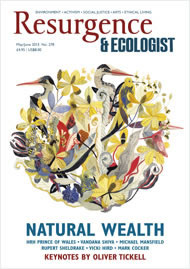Colin Ward (who died in 2010 aged 85) declared himself to be an anarchist. Anarchy has had a bad press. In 1894 a French anarchist called Martial Bourdin entered history as an early suicide bomber by blowing himself up outside the Greenwich Observatory in London. This incident became the subject of Joseph Conrad’s tragi-comic novel The Secret Agent, in which a bunch of bungling misfits fail to bring down the Observatory, let alone Capitalism, and end up with personal disaster.
Together, Bourdin and Conrad set the tone of public thinking on anarchy for generations to come. An association with the murderous Baader-Meinhof Gang and the Red Army Faction in the 1960s and 1970s didn’t help improve the branding of anarchy much, either.
It is this heritage that has led to a continuing public revulsion. When a march organised by the Trade Union Congress in London in March 2011 ended in shops being set on fire, the Daily Telegraph headline read: “Anarchists on the Streets of Central London”. Were they anarchists? Or just yobs? Is an anarchist a particularly sinister type of yob?
The movement – if it can be dubbed such – does little to help itself. Never has there been a greater proliferation of competing and conflicting ‘isms’. How does anarcho-naturism work with anarcho-syndicalism? Do the anarcho-capitalism people talk much to the apostles of anarcho-communism? What has anarcho-pacifism, which was championed by the author of The Joy of Sex, got to do with egoist-anarchism? And how do any of these relate to post-anarchism?
There is no doubt that Ward thought of himself as an anarchist, but he frequently fell out with hardliners, and his interest always lay in helping people in need rather than in promoting an ideology.
In the late 1960s, when promoting the use of empty properties to accommodate homeless people (squatting), he was willing to enter into agreements with sympathetic local authorities in order to get results. This annoyed some more extreme groups, who felt that he had sold out to the system.
He was always pragmatic and focused on beneficial social outcomes. Ron Bailey, who campaigned with Ward in the 1970s, told me: “Colin believed – as I do – that if anarchism is about anything, it is about people and their dignity – not about having a punch-up for the sake of it.” I could buy into that kind of anarchy.
The common theme of this collection of essays and speeches, which date from the early 1970s to the late 1990s, is the importance of empowering people to find answers to the problems they face in their own communities, rather than relying on state ‘solutions’. Ward ranges with eloquence and with broad cultural and political reference across subjects as diverse as allotments and “the meaninglessness of international resolutions”.
This book is a good, provocative read; many of Ward’s ideas were ahead of their time and are gaining political traction now. A phrase he often used to describe his view of anarchy was “the seed beneath the snow”; could it be that the seeds are emerging in what is now called ‘localism’? Not all anarchists are wrong.







